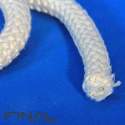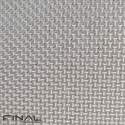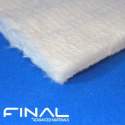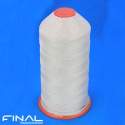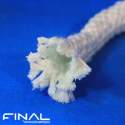E Glass Fibre
Final Advanced Materials offers a full range of products in various forms of E-fiberglass: packings, felts, fabrics, sleeves, braided ropes, twisted ropes and sewing thread.
What is E-fibreglass?
Fibreglass has been in use since 1930, in large-scale industrial applications, as a high-temperature insulator for electrical conductors. E-glass fibres are the most widespread in use, whether in the textile industry or for composite materials, and are present in 90% of reinforcements. This high-quality fibre is distinguished by its resistance to high temperatures and its excellent electrical insulating properties. This fibre is rot-proof, resistant to the most common chemical agents and remains dimensionally stable, even against substantial variations in humidity and temperature.
E-glass filaments of diameter exceeding 9μm can cause skin irritations, whereas filaments with a diameter under 3μm can build up in the respiratory system. For these reasons, E-glass fibres supplied by Final Advanced Materials are produced from textured and twisted strands of diameter ranging from 6 to 9µm.
These E-glass products complement Newtex’s product range.
Fibreglass manufacturing
E-fibreglass’s manufacturing follows several steps. First, boron oxide is added to silica, lime, alumina and magnesia. Alkaline oxides are excluded from this mix. This composition is then ignited and at around 800 °C. The molten paste begins to take on a viscous consistency, then liquid before it vitrifies. At 1,500 °C, the last bubbles and impurities disappear from the glass. When refined, the molten mass is perfectly transparent and the mass is passed through dies (platinum alloy plates pierced with hundreds of holes) to produce a glass thread. This thread is then sized, wound and dried.
General Characteristics of E-fibreglass
Physical and mechanical characteristics
E-glass products are particularly resistant to abrasion and vibration and have excellent flexibility. Glass threads have a higher specific resistance (tensile strength/volumetric mass) than that of steel. This feature makes it possible to develop glass threads that reinforce high-performance composites.
Thermal Properties
E-fibreglass has low thermal conductivity. For example, for felt, conductivity is 0.03W.m-1.K-1. The fibre can withstand temperatures of over 600°C and is non-combustible.
Chemical Properties
Products made of E-fibreglass are resistant to oils, solvents and most chemical agents. They are also rot-proof.
Dimensional Stability
Glass thread is insensitive to variations in temperature and humidity and has a low expansion coefficient.
Electrical Properties
E-glass threads have excellent electrical insulation properties, even at low thickness.
Benefits of E-fibreglass
- Inorganic
- Good resistance to abrasion and vibrations
- Incombustible
- Rot-proof
- Resistant to the main chemical agents
- Excellent dielectric strength
- Excellent dimensional stability
- Compatible with organic dies
Comparison
|
Property |
Unit |
E-Glass |
Pure Silica | Kevlar® |
|
Density |
g/cm3 |
2.6 |
2.2 |
1.44 |
|
Poisson Coefficient |
- |
0.25 |
0.16 |
0.36 |
|
Breaking Strength |
MPa |
2,400 |
3,600 |
3,000 |
|
Elongation |
% |
3.5 |
7.7 |
2.4 |
|
Linear Expansion Coefficient |
10-6/K-1 |
9 |
0,54 |
- 2 |
|
Max. Operating Temperature |
°C |
550 |
1,000 |
300 |
|
Peak Temperature |
°C |
700 |
1,200 |
450 |
|
Specific Heat at 20 °C |
J.kg-1. K-1 |
720 |
750 |
1,420 |
|
Thermal Conductivity |
Wm-1. K-1 |
0.8 |
1.8 |
0.4 |
Applications of E-fibreglass
- Electrical insulation
- Thermal insulation
- Various reinforcement
- Composite products
- Transport
- Buildings
- Aeronautics
- Sealing for oven doors
- Sealing for piping
- Protection of cables, sheaths and pipes
- Insulation
- Induction coil protection
E-glass products
Threads
E-glass fibre threads can withstand peak temperatures up to 700 °C and operating temperatures up to 550 °C. To facilitate their sewing, the glass fibre threads are coated with PTFE. The sewing threads are strong and suitable for the assembly of heat protection as well as dielectric, chemical and thermal insulation. Final Advanced Materials provides E-glass fibre threads coated with PTFE in sizes ranging from 70 to 430 tex.
Packings
Packings consist of an outer sheath made of 9 μm E-fibreglass and a ceramic fibre core, suitable for high temperature applications up to 700 °C. They have excellent mechanical, thermal and dielectric properties. They are available in round or square sections. Packings are mainly used as seals for the insulation of industrial furnaces and in the metallurgical industry.
Felts
E-glass fibre needle felts offer excellent dielectric, mechanical and chemical properties. Moreover, these products can withstand peak temperatures up to 700 °C and operating temperatures up to 550 °C. Different treatments can improve the felts' properties, such as their resistance to wear, cutting, splashes of molten metal or to radiant heat. They are mainly used in the naval and automotive industries for thermal and acoustic insulation. Final Advanced Materials proposes untreated E-glass fibre needle felts or with an adhesive, steel or an aluminium finish.
Twisted Ropes
At Final Advanced Materials, E-fibreglass twisted ropes are manufactured using filaments of diameter ranging from 6 to 9 µm. They are employed in applications involving operating temperatures up to 550 °C and peak temperatures up to 700 °C. E-fibreglass twisted ropes are available in diameters ranging from 3 to 60 mm.
Braided Ropes
In round or square sections, E-fibreglass braided ropes are manufactured from E-glass filaments with a diameter ranging from 6 to 9 µm. These are used in applications involving peak temperatures up to 700 °C and operating temperatures up to 550 °C. Various treated versions are available: silicone, rubber or PTFE coated, graphite-impregnated, coupled with aramid or a stainless-steel sleeve. This improves the mechanical properties of braided ropes, reduces the pollution by airborne fibres or optimises sealing. E-glass fibre braided ropes are available in standard diameters ranging from 4 to 60 mm with a round or square section.
Sleeves
E-glass fibre sleeves are highly flexible, thereby facilitating the insertion of cables or pipes to be insulated. These sleeves are used for the thermal protection and electrical insulation of cables and pipes. Silicone-coated, lacquered or stainless steel-clad versions are available on request, for the improvement of mechanical and dielectric properties and the prevention of the loss of stray fibres. Sleeves are available in standard diameters ranging from 12 to 60 mm, in braided or knitted versions.
Fabrics
E-glass fibre fabrics are manufactured with E-glass filaments with a diameter ranging from 6 to 9 µm to prevent the possible risks of build-up in the respiratory system and skin irritation. These products can withstand operating temperatures up to 550 °C and peak temperatures up to 700 °C. In the industry, these fabrics are used for the manufacture of gaskets, compensators, thermal reflectors or protective clothing. Our glass fibre fabrics are available untreated or with a vermiculite, silicone or aluminised coating.
Tapes
E-glass fibre tapes are valued in the industry for their resistance to high temperatures. They can withstand operating temperatures up to 550 °C and peak temperatures up to 700 °C. Moreover, these tapes offer good electrical insulation properties and can resist chemical agents. At Final Advanced Materials, E-glass fibre tapes are available untreated, with a vermiculite finish or an adhesive side. These treatments enhance the resistance of the tapes to abrasion and their ability to withstand peak temperatures.
Physical variables included in this documentation are provided by way of indication only and do not, under any circumstances, constitute a contractual undertaking. Please contact our technical service if you require any additional information.
E-Glass Fibre Braided Ropes 700 °C
E-Glass Fibre Fabrics 700 °C
E-Glass Fibre Felts 700 °C



